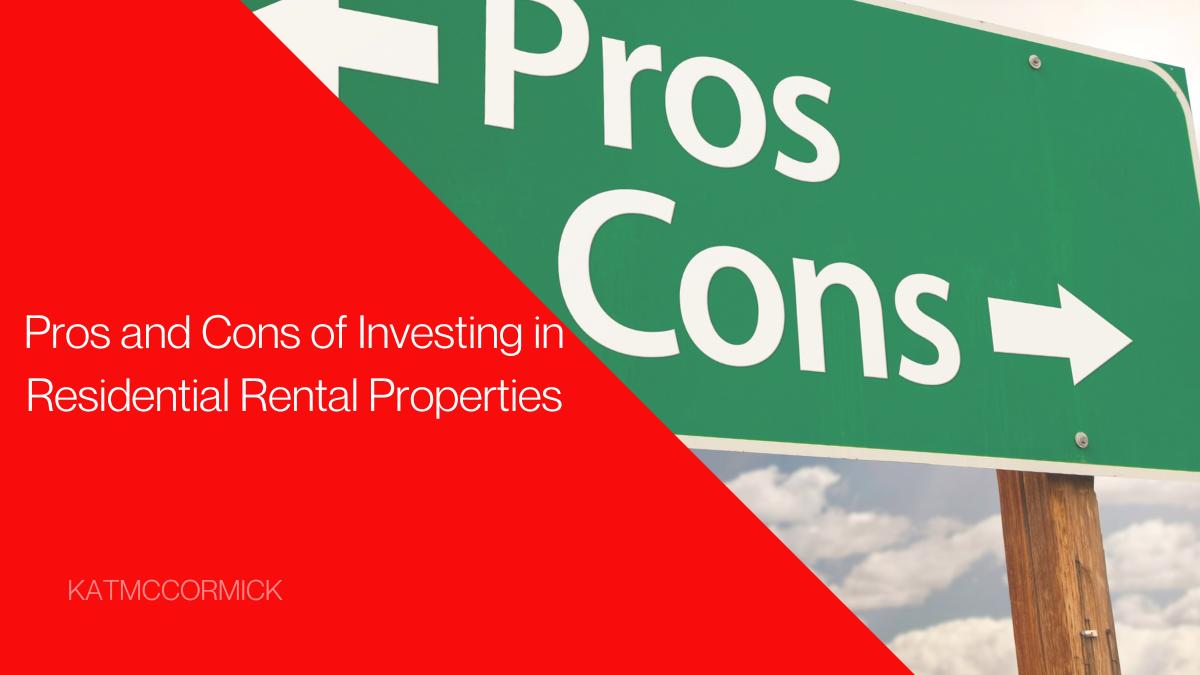Are rental homes on your list of potential investments? While having rental properties can be financially rewarding, it’s important to be aware of the risks involved. Whether you’re a seasoned veteran or just starting out, this article will arm you with the knowledge you need to make smart decisions while investing in residential real estate.
The Pros of Investing in Residential Rental Properties
Steady Cash Flow: The prospect for stable income is a major perk of investing in residential rental homes.
Appreciation of Property Value: Residential rental properties, like most other types of real estate, tend to increase in value over time.
Tax Benefits: Mortgage interest, real estate taxes, insurance payments, and other business expenditures can all be deducted from your taxable income.
Portfolio Diversification: Adding rental properties to your investment portfolio is a great way to spread your risk.
Inflation Hedge: Inflation typically increases rental costs, so having a steady stream of rental income is a good way to protect your purchasing power.
Leverage: You can utilize borrowed money to “leverage” your real estate investment buy. As a result, you can increase your profits and take charge of a larger asset with the same amount of money.
Forced Savings: Rental property ownership is a great motivator for frugal spending habits.
Home Price Index Growth: Residential real estate investments in regions with a rising home price index can generate sizable returns over the long term.
The Cons of Investing in Residential Rental Properties
Property Management Challenges: For first-time landlords, the challenges of tenant complaints, maintenance requests, and vacancies can be overwhelming.
Vacancy Risks: Vacancy rates for rental properties can be high, especially during economic downturns and in stagnant real estate markets.
Property Maintenance Costs: These expenses may come up out of the blue, putting a damper on your budget.
Potential Bad Tenants: As a landlord, you might have to deal with renters that are a pain because they don’t pay on time, cause damage, or make a nuisance of themselves.
Market Risk: Investment in residential rental properties during a real estate market downturn carries the risk of a negative return.
Initial Investment: Purchasing a home to use as a rental property calls for a substantial outlay of capital. Some investors, especially those with little money to spare, may find this to be an impediment.
Frequently Asked Questions
Is investing in residential rental properties a good idea for beginners?
If they do their homework and consult with experts, inexperienced investors might certainly find success in the residential rental property market.
How can I finance the purchase of a rental property?
Mortgages, private investors, and business joint ventures are only some of the financial arrangements that might be made.
What are some tax deductions available for rental property owners?
Mortgage interest, taxes, insurance, repairs, and maintenance are just some of the expenses that can be deducted by landlords.
How do I find reliable tenants for my rental property?
Get help from a tenant screening agency, verify references, have interviews, and do background checks to discover reliable tenants.
Should I invest in a single-family home or a multi-unit property?
There are benefits and drawbacks to both choices. Think about your financial situation, where you want to invest, and how long you plan to keep the money.
How can I handle property management efficiently?
In order to efficiently manage your rental properties, you may either employ a property management company or use property management software.
Final Words
Renting out one’s home can be a lucrative investment strategy due to the multiple monetary benefits it provides, including a reliable source of income, tax breaks, and portfolio diversification. Property management, the possibility of vacancies, and the expense of routine upkeep are all disadvantages. You can make a well-informed decision and get off to a good start in real estate investing if you give it some thought and do some homework first.
- Key Strategies to Mitigating risks in Rental Property Investments
- The Essential Role of Property Management Companies
- The Ultimate Guide to Handling Evictions and Tenant Conflicts
- The Hidden Impact of Taxes and Insurance Costs
- Protect Your Property: Essential Practices for Effective Tenant Screening

